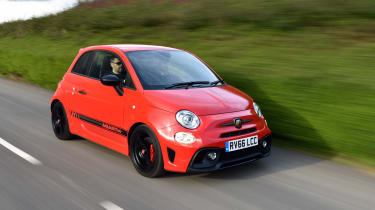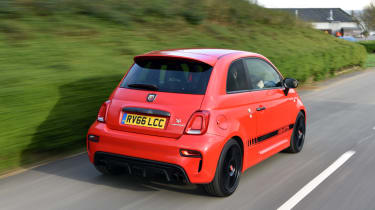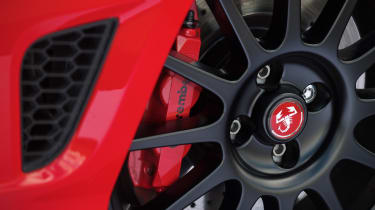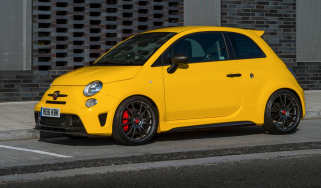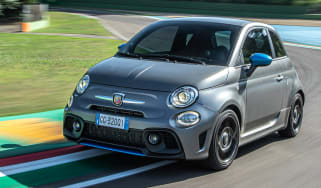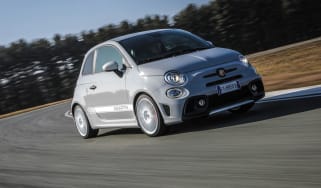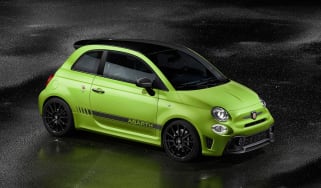Abarth 595 review - how does it compare to the Up GTI?
Low on sophistication, high on fun – Abarth’s hatch isn’t for everyone, but some will love it.
It’s hard to believe, but Abarth has been selling hotted-up versions of the Fiat 500 supermini since 2008, and in more than a decade the basic ingredients have barely changed, so the recipe must be fairly sound.
And while undoubtedly long-in-the-tooth these days, there’s still much to like about the tiny, retro-styled hot hatches. Quick, noisy and bouncy, they’re a window into how cars like this used to be before 300-horsepower outputs, adaptive dampers and any sense of sophistication were commonplace.
That naturally reduces the car’s potential market down to just a hardy few, and if we’re being honest Abarth’s hatches are littered with faults, many related to the basic car’s ageing platform. Particularly towards the top end of the range, you’d be much better off with a Ford Fiesta ST – a car that pairs its performance with chassis sophistication, greater occupant safety and better liveability.
But if you’re prepared to trade all that for the 595 and 695’s simple, fun-loving nature, noisy exhausts and exotic-in-miniature detailing, then we salute you – and you probably won’t be disappointed with your purchase.
Abarth 595 in detail
Engine, transmission and technical details> One engine, several power outputs, and a pair of transmissions keep things simple, but there’s surprising variety under the skin from model to model.
More reviews
Performance and 0-60 time> The quickest models really are quite brisk, dipping under 7 seconds to 62mph and topping 140mph. Even the basic 595 can see off a Mini Cooper.
Ride and handling> Stiff suspension and fairly one-dimensional dynamics will deter some, but if you’re in the right frame of mind the 595 can be a hoot, and the small size makes it ideal for tight UK backroads.
MPG and running costs> Economy in the 40s should be possible in normal use, though so-so CO2 figures mean tax costs aren’t as low as some superminis.
Interior and tech> The high driving position feels odd and there are some quality quirks, but higher-spec models in particular feel quite special thanks to great detailing.
Design> The basic design is over a decade old but still feels fresh thanks to subtle updates in recent years. Still an eye-catching city car.
Prices, specs and rivals
The basic Abarth 595 is one of the more affordable hot hatchbacks on the market, kicking off at £15,980, undercutting a Mini Cooper by around £1300 but coming in around £1900 more than the bargain that is the Volkswagen Up GTI.
These models get 16-inch alloy wheels and a fairly well-trimmed cabin, with sports seats, metal-finished pedals, a leather gearknob, TFT instruments and a basic infotainment system with a five-inch touchscreen. They can be jazzed up sufficiently too, with leather trim available for a reasonable £850 and larger wheel options, along with a larger seven-inch touchscreen with navigation for £750.
The range then steps up to the £18,480 Trofeo, which gets a more powerful engine, 17-inch wheels, more vivid colour options (including the Lamborghini-like Adrenaline Green), and introduces the option of the Sabelt sports seats available on the Competizione – though given they’re a £1750 option, you might be better off opting for the higher-specced car in the first place.
An alternative is the Turismo, which aims more towards luxury than outright sports appeal, its £19,180 price tag getting 17-inch wheels and leather trim as standard, and unlocking options like two-tone paintwork for £900.
The £21,280 Competizione is more appealing for us though, including the aforementioned Sabelt seats, as well as netting you more power, several more alloy wheel variants and aluminium pedals. Set aside another £2700 for the Performance Pack and you get leather trim and carbonfibre backs for the Sabelt seats, and a mechanical limited-slip diff.
Topping the range is the £23,380 Abarth 695 Rivale, which matches the Competizione on power and cranks up the luxury: a Riva speedboat-inspired two-tone paint scheme is standard, as are 17-inch Supersport alloy wheels, an Akrapovic exhaust, blue leather seats, and a carbonfibre dashboard. Most Abarth options are standard, though you can still add a limited-slip diff (£1650) and an option we’d specify regardless of trim level, the £675 Xenon headlights, as the standard units are hopeless. An automated manual gearbox is £1350, available from the Turismo up.
The 595’s two closest rivals are probably the Mini Cooper and its ever escalating variants, and the Volkswagen Up GTI, which has just a choice of three or five doors but is something of a standard bearer in the world of inexpensive hot hatchbacks.
Both are more sophisticated to drive than the Abarth, but the Mini’s increasingly gauche styling looks like it’s trying too hard next to the 595 and while the basic Cooper is a laugh, you get diminishing returns as you move up the range. Thus the Up GTI would probably be our choice – it’s more composed than the Abarth but still good fun, its styling is sophisticated and urbane, and as an actual car it’s a bit easier to live with. All it lacks is a higher-performance model, but by the time the Abarth reaches the £20k mark you’d probably be better off looking at Fiesta STs and the like anyway...

